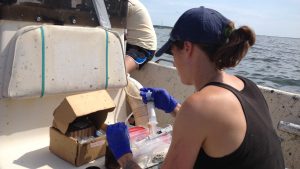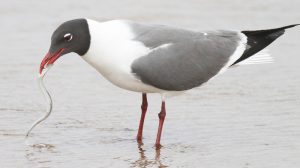Search results for: Delta Airlines 1800-299-7264 Official Site Customer Service
Aquaculturists
Aquaculturists Our region is home more than 300 shellfish farming operations on over 1,000 acres. Woods Hole Sea Grant extension agents meet regularly with aquaculturists and provide them with technical assistance based on research and our knowledge of local habitats and conditions. WHSG also offers professional development opportunities to help shellfish farmers improve their operations.…
Read MoreUnderstanding the Waquoit Bay Ecosystem
A Q&A with Sarah Foster Sarah Foster is a Boston University graduate student doing her dissertation research in Waquoit Bay (Cape Cod, Massachusetts). A biogeochemist, Sarah investigates the impact hypoxia, or low oxygen, in the water has on crucial functions within Waquoit Bay’s ecosystem. She recently published research she and her co-author, Wally Fulweiler conducted in…
Read MoreHydrodynamical Modeling of a Multiple-inlet Estuary/Barrier System: Insight into Tidal Inlet Formation and Stability
Hydrodynamical Modeling of a Multiple-inlet Estuary/Barrier System: Insight into Tidal Inlet Formation and Stability Friedrichs, C.T., D.G. Aubrey, G.S. Giese, and P.E. Speer In: Aubrey, D.G. and G.S. Giese (eds.), Formation and Evolution of Multiple Tidal Inlets, Coastal and Estuarine Studies, American Geophysical Union, Washington, D.C., Vol. 44, pp. 95-112, 1993 WHOI-R-93-010
Read MoreTechnology Enables Better HAB Monitoring and Mapping
Technology Enables Better HAB Monitoring and Mapping The project’s sampling plan for the Nauset area of Cape Cod. Sept. 2018 — Nauset Marsh in Eastham, Mass. on Cape Cod serves as a “natural laboratory” for researchers working to better understand harmful algal blooms (HABs) or red tide. HABs in Nauset are caused by the phytoplankton…
Read MoreWHOI-W-05-001 Whitlach, B. International Inv
WHOI-W-05-001 Whitlach, B. International Inv
Read MoreSea Grant Two if by Sea Vol. 8 No. 2 A joint n
Sea Grant Two if by Sea Vol. 8 No. 2 A joint n
Read MoreThe Little Fish with a Big Impact
In the Gulf of Maine, there’s a little eel-like fish not much bigger than a large pencil, that buries itself in the sand in the summer and swims up and down in the water column in the spring and fall. It’s called a sand lance and it’s incredibly important to the ecosystem of the Gulf of Maine. If you like whale watching, this little fish is the biggest reason you might or might not see a whale:
Read MoreTeacher Workshop November 2003
Teacher Workshop November 2003 “Right Whale Ecology at the Intersection of Science, Technology, and Conservation” Dr. Mark Baumgartner is an Assistant Scientist in the Biology department of Woods Hole Oceanographic Institution. He studies the foraging behavior and ecology of whales, and the formation and location of the patches of plankton that whales feed on. In this…
Read More2004-2006 Projects
Environmental Contaminants and Fish Reproduction Not if, but how? That is the question WHOI postdoctoral investigator Joanna Wilson is asking about how certain environmental contaminants effect marine and freshwater fish reproduction. By applying new research tools—advanced mass spectrometry and proteomics—Wilson and her former graduate advisor, John Stegeman, a WHOI senior scientist, will measure proteins associated…
Read MoreCoastSnap
Becoming a beach scientist is a snap. Share your photos from iconic beaches to help us better understand and manage our dynamic coast. Next time you are at one of our CoastSnap locations, become a scientist for the day by helping us measure how our beaches change over time. What is CoastSnap? CoastSnap is a…
Read More

